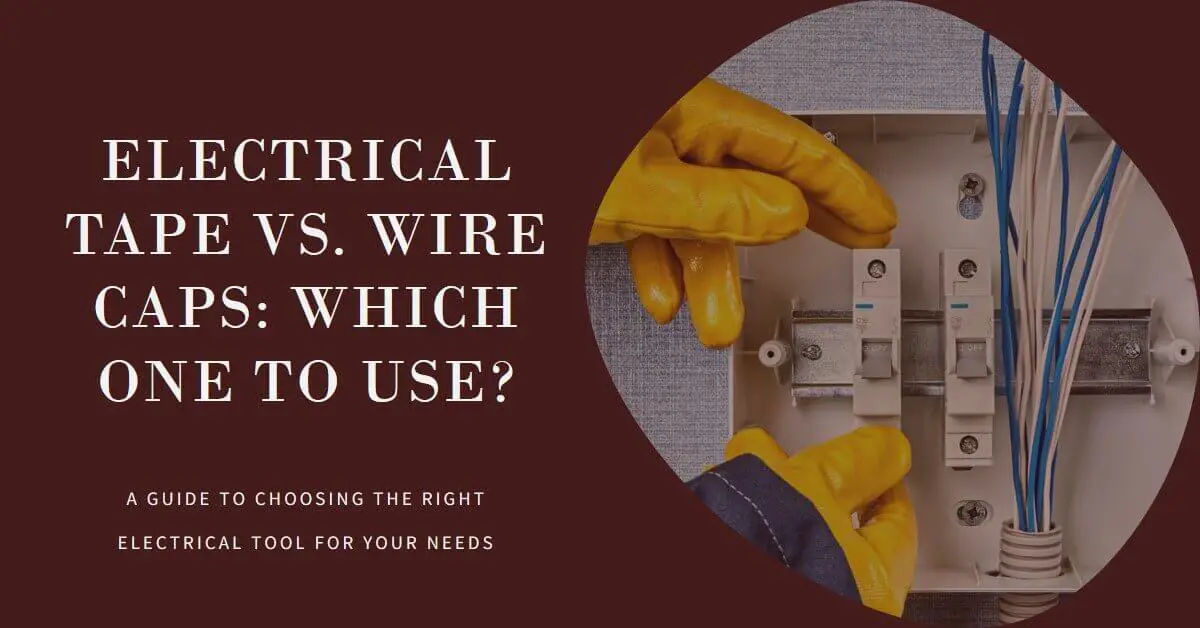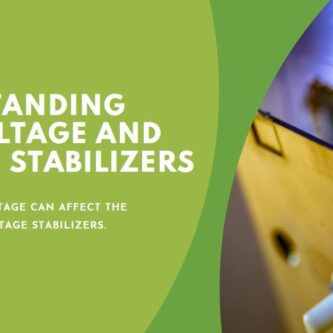Image: “Article Feature Image” by Bing is licensed under [CC BY-NC-SA 4.0]. Source: Bing Graphic Art.
When it comes to electrical connections, ensuring proper insulation and secure connections is crucial for safety and functionality.
Wire caps, also known as wire connectors or wire nuts, are commonly used to join and insulate wires.
However, in certain situations, you may wonder if electrical tape can serve as a suitable alternative to wire caps.
Electrical tape is appropriate for temporary fixes, low-voltage setups, and wire organization. Nevertheless, when dealing with crucial links, high-voltage systems, or situations involving vibrations, wire caps become indispensable to ensure optimal safety and reliability.
In this article, we will explore the characteristics of electrical tape, its advantages and limitations, and compare it to wire caps to determine when it can be used effectively.
Understanding Wire Caps
Wire caps are small devices designed to join and insulate electrical wires. They provide a secure connection by twisting together the exposed ends of wires, while also insulating them to prevent electrical shocks and short circuits.
Wire caps come in various sizes and are color-coded to match different wire gauges for easy identification and selection.
Read also my comprehensive article: Don’t Let Your Electric Wire Nuts Melt: Tips For Safe Installation.
Electrical Tape as an Alternative
Electrical tape, a type of adhesive tape specifically designed for electrical applications, can be considered as an alternative to wire caps in certain scenarios.
It is made of durable, flexible material that provides electrical insulation and can be wrapped around wires to secure and protect them.
It is suitable for temporary repairs, low-voltage systems, and wire bundling. However, for critical connections, high-voltage systems, or applications subjected to vibrations, wire caps are essential for safety and reliability.
Additionally, compliance with electrical codes and regulations is crucial, as some jurisdictions mandate the use of wire caps for specific types of connections.
Therefore, while electrical tape can be a practical option in certain scenarios, it is important to assess the specific requirements, safety concerns, and compliance regulations of the electrical connection to make an informed decision on whether to use electrical tape or wire caps.
When in doubt, it is recommended to consult with a qualified electrician to ensure the appropriate choice for your specific situation.
Let’s explore the advantages and limitations of using electrical tape:
Advantages of Electrical Tape
- Flexibility: Electrical tape can conform to irregular shapes and contours, making it suitable for wrapping around wires of different sizes and configurations.
- Insulation: Electrical tape provides a layer of insulation that helps protect against electrical shocks and short circuits.
- Water Resistance: Some types of electrical tape are designed to be water-resistant, which can be beneficial in damp or outdoor environments.
- Cost-Effective: Electrical tape is generally more affordable compared to wire caps, making it a budget-friendly option for certain applications.
Read also my article: Electric Tape Vs. Regular Tape: Which Is Safer For Electrical Work?
Limitations of Electrical Tape
- Durability: Over time, the adhesive on electrical tape may degrade, especially in high-temperature environments or when exposed to UV radiation, potentially compromising its effectiveness.
- Mechanical Strength: While electrical tape offers some mechanical strength, it may not provide the same level of secure connection as wire caps, particularly in applications subject to vibrations or movement.
- Code Compliance: In some jurisdictions, electrical codes mandate the use of wire caps for specific types of connections, making electrical tape unsuitable for compliance in those situations.
Considerations for Using Electrical Tape
Before opting for electrical tape as a substitute for wire caps, it is essential to consider the following factors:
- Safety Concerns: Ensure that using electrical tape meets safety requirements for the specific application. In critical or high-risk situations, it is advisable to use wire caps to guarantee a secure and reliable connection.
- Regulatory Compliance: Familiarize yourself with local electrical codes and regulations to ensure compliance with relevant standards. Failure to comply with regulations can lead to safety hazards or legal consequences.
- Long-Term Durability: Evaluate the anticipated lifespan and environmental conditions of the connection. If the connection is expected to be long-lasting or subjected to harsh conditions, wire caps may be a more durable and reliable choice.
Comparison: Electrical Tape vs. Wire Caps
Let’s compare electrical tape and wire caps across several key factors:
- Ease of Use: Electrical tape can be easily wrapped around wires, while wire caps require twisting and tightening. Electrical tape offers more flexibility in tight spaces or complex wire arrangements.
- Electrical Insulation: Both electrical tape and wire caps provide electrical insulation. However, wire caps generally offer a more reliable and consistent insulation level due to their design.
- Mechanical Strength: Wire caps provide a stronger and more secure mechanical connection compared to electrical tape, particularly in applications prone to vibrations or movement.
- Reliability: Wire caps are specifically designed for electrical connections, ensuring a reliable and consistent connection. They have been extensively tested and proven to provide long-term reliability. Electrical tape, while suitable for certain applications, may have limitations in terms of long-term reliability.
Recommended Applications for Electrical Tape
While wire caps are generally the preferred choice for most electrical connections, there are specific scenarios where electrical tape can be used effectively:
- Temporary Repairs: Electrical tape can serve as a temporary solution for minor repairs or when wire caps are not readily available. However, it is crucial to replace the tape with wire caps as soon as possible for a more secure and reliable connection.
- Insulation in Low-Voltage Systems: In low-voltage applications, such as low-power electronics or low-voltage lighting, where the risk of electrical shock is minimal, electrical tape can provide sufficient insulation.
- Bundling Wires: Electrical tape can be used to bundle and organize wires, providing a neat and protected arrangement.
Instances Where Wire Caps Are Essential
While electrical tape can be a practical alternative in certain situations, there are instances where wire caps are essential for safety and compliance:
- High Voltage Systems: In high-voltage applications, where the risk of electrical shock is significant, wire caps should be used to ensure a secure and insulated connection.
- Connections Subjected to Vibrations: For connections that are exposed to vibrations or movement, such as those in machinery or automotive applications, wire caps offer superior mechanical strength and reliability.
- Code Requirements: Electrical codes and regulations often mandate the use of wire caps for specific types of connections. Compliance with these codes is essential to ensure safety and avoid legal implications.
Conclusion
While electrical tape can be a convenient and cost-effective option in certain situations, it is important to assess the specific requirements and safety considerations of the electrical connection.
Wire caps, with their secure connection and reliable insulation, are generally the preferred choice, especially in high-voltage systems or applications subjected to vibrations.
Always prioritize safety, code compliance, and long-term reliability when making decisions about electrical connections.
Wire caps are manufactured in different sizes and types to accommodate different wire gauges and voltage requirements.
It is essential to select a wire cap that is specifically rated for the voltage level of the electrical system or circuit being used.
When working with high voltages, it is advisable to consult the manufacturer’s specifications or seek guidance from a qualified electrician to ensure the correct wire cap is chosen to handle the specific voltage requirements safely and effectively.
you work With Electricity! Don’t leave empty-handed!
Looking to stay ahead of the game in the world of electrical engineering? Subscribe to my YouTube channel and gain access to exclusive content you won’t find anywhere else!
The staff I recommend (Amazon Affiliate Links to products I believe are high quality):
- Economy 120 Volt/60Hz AC Power Source – Step-Down Voltage & Frequency Converters 1800W
- UNI-T Digital Multimeter Tester UT139C
- 50-Amp Extension Cord for RV “100ft”
- Voltage Stabilizer 110/220v
- Hair Dryer “best selling“
- TOSHIBA EM131A5C-BS Countertop Microwave Ovens
Disclaimer: This contains affiliate links to Amazon products. I may earn a commission for purchases made through these links.




